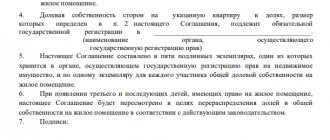Home » Division of property » How to properly divide a non-privatized apartment between relatives
3
Non-privatized housing is not subject to direct division, since it is not the property of any of the residents. As a result, it is almost impossible to divide the property between relatives. Nevertheless, it can be pre-privatized and only then divided on a general basis or exchanged for other housing.
Rights to a municipal apartment during divorce
Municipal apartments are the property of the municipality and can be allocated to certain categories of citizens: low-income people, military personnel, employees of the Ministry of Internal Affairs, etc. The conclusion of a social tenancy agreement gives them the right to use residential premises, but not the right of ownership. Upon expiration of the document, all tenants are subject to eviction.
Most actions related to housing under a social tenancy agreement are carried out in agreement with the landlord.
After a divorce, Art. 69 Housing Code of the Russian Federation. It states that citizens indicated in the social tenancy agreement, but who have ceased to be members of the tenant’s family, have the right to use residential premises on an equal basis with him and his relatives.
Based on clause 30 of the Resolution of the Plenum of the Armed Forces of the Russian Federation dated July 2, 2009 No. 14, former spouses have the right to demand that employers enter into an agreement to determine the amount and procedure for paying fees for housing and communal services, as well as to separate personal accounts. If division is refused, the issue is resolved through the court.
How to divide a personal account in a privatized apartment
Dividing personal accounts between apartment owners is a complex procedure. Most often, this need arises if one of the owners does not participate in the payment of utility bills. If the personal account is common, the debt obligation is imposed on all owners of the living space. If the account is divided, the debt becomes personalized. But it will be easier to find another way out of the situation.
You can divide your personal account in a privatized apartment:
- By agreement through the management company
- Through the court
Section by agreement
If an agreement is reached between the owners on the division of the personal account, they can contact one of the companies that provides them with utility services. First, all owners enter into an agreement among themselves, in which they determine the shares of payment for utilities and other services. Along with the signed agreement and application for the allocation of separate personal accounts, it is necessary to submit the established package of documents to the company. If necessary, the application and documents can be submitted through the MFC. Or you just need to agree on who pays for the utility bills and how much - that’s much simpler.
Documents for issuing a separate personal account:
- extract from EGRN;
- owner's passport.
If the utility company approves the request, it will enter into an agreement with each of the owners, accounts and responsibility for paying for the services provided will be divided.
Important! The company may refuse to split the personal account between two owners if a single meter is installed in the apartment or there are debts for utilities. In this case, the issue can be resolved through the court.
How to divide a personal account in a privatized apartment through the court
If the owners have not reached an agreement on the issue of dividing the bills for the apartment, the initiator of the division can go to court. According to the housing code, it is very difficult to divide a personal account for payment of utilities through the court, but it is possible in rare situations and in the event that the management company has rejected the request enie or left him without an answer.
To file a claim, you need to collect the following documents:
- information about family composition;
- a copy of the plaintiff’s passport;
- passport for the apartment or extract from the Unified State Register;
- a copy of the personal account;
- a copy of the refusal from the management company.
The list of documents depends on the specifics of the situation. Additionally, you may need a copy of the refusal of the company that provides utilities, or receipts that confirm that the plaintiff pays his part of the bills.
Based on this package of documents, you can file a claim for division of your personal account.
An example of how to correctly write a statement of claim:
District court - one of the owners Defendant - a company that provides utilities, or a second owner Data, contacts of the plaintiff - full name, registration address, telephone
Statement of claim (clarification “about the division of the personal account” is allowed)
I, full name, am the owner of ½ share by right of common ownership of the apartment at address ___. The second owner of the said apartment is the full name (hereinafter referred to as the defendant), who does not participate in the payment of utility bills. There is no agreement on the distribution of bills for housing maintenance and consumer goods. On my part there is no debt for utilities; full payment of the corresponding share in the bills is confirmed by the documents (receipts) submitted by me.
I ask the court:
- Establish the procedure and shares in payment for the services of the management company that services the apartment at address __.
- Oblige the management company to divide the personal apartment account and send separate payment documents for services to each of the owners.
- Oblige the defendant to pay his share for utilities.
The number of points in the petition may be expanded. The list of documents that confirm the legality of filing a claim and the information specified in it is given below. At the end of the application, the plaintiff puts a date and signature.
To file a claim for the division of personal accounts between owners, submit the documents in person to the district court office, or send them by mail or via the Internet.
Before the judicial commission begins its work, it is necessary to pay a state fee of 300 rubles.
Division of a municipal apartment during divorce
Despite the preservation of the right to use non-privatized housing, cohabitation between former spouses is rarely possible. The optimal solution is the division of real estate. To do this, you can use one of several options:
- privatize the living space by agreement with the allocation of shares to each family member, then sell it;
- exchange one apartment for two different ones without privatization.
Privatization and subsequent division of the apartment
Features of privatization are regulated by Federal Law No. 178-FZ dated December 21, 2001. What the procedure looks like:
- Accounting for the number of participants. All persons registered for housing have the right to participate in privatization. If they refuse this, a written refusal is issued. If children are included in the social tenancy agreement, but are not registered in the living space, permission from the guardianship authorities will be required.
- Collection of documents.
- Submission of documents for privatization to the MFC or municipal administration.
- Concluding an agreement on the transfer of ownership.
Documents required for privatization:
The main document giving the right to the procedure is a warrant or social tenancy agreement. Also at different stages, citizens will need:
- technical and cadastral passports;
- extracts from the house register and the Unified State Register of Real Estate;
- a certificate from the BTI to confirm non-participation in privatization earlier;
- personal account for housing and communal services;
- refusals of other persons from privatization certified by a notary office;
- permission from the guardianship authorities (if there are children);
- participants' passports.
Before submitting the documentation, a state fee of 2000 rubles is paid. from each participant. Children under 14 years of age are exempt from payment.
Exchange and division of apartments
Exchange is the best option for former spouses who do not want to live together. However, this is not always possible, and several nuances need to be taken into account:
- Service housing or housing belonging to specialized housing stock does not change.
- If children are registered in the living space, the consent of the guardianship authorities will be required. If living conditions deteriorate as a result of the exchange, a permit will not be issued.
- The changing housing is in disrepair.
- The presence of debts for housing and communal services is an obstacle to exchange.
The main criterion for the exchange is the consent of the landlord and all citizens registered in the property. Step-by-step procedure for exchanging a non-privatized apartment:
- The tenant contacts the landlord with a request for an exchange.
- After considering the application, the landlord makes a decision. If the answer is positive, two different apartments are allocated, corresponding in area to the one being changed.
- An exchange agreement is concluded. Previous contracts are terminated.
If a citizen finds a new landlord, he will need to draw up another social tenancy agreement after terminating the old one.
Is a gifted or inherited apartment divided when spouses divorce?
How is an apartment divided during a divorce if the owner is a husband or wife?
Key aspects of the operation of non-privatized housing
When using municipal housing, spouses should know a number of features of living:
- If one of the spouses is not registered in the residential premises, after a divorce he has no right to claim this apartment during the division of common property. This also applies to situations where the second spouse is registered in the apartment.
- If one of the parties refused to take part in the apartment privatization procedure, both residents lose all their rights to this housing.
- Upon divorce, spouses do not have the right to demand the exchange of premises from the owner of municipal property. The owner of the property must not provide the parties with separate apartments or rooms. The parties must decide for themselves any methods of dividing or exchanging housing.
The right of ownership of housing that has not undergone the privatization procedure, in the event of a divorce of spouses and division of joint property, remains with its owner (state, municipality, etc.). In this regard, the apartment is not subject to division.
The most profitable solution and provisions are to complete the housing privatization procedure and divide the apartment into shares in order to sell it later.
The parties can exchange a municipal apartment by exchanging it for residential premises, also owned by the municipality.
Division of accounts in a municipal apartment during divorce
If the former spouses decide to continue living under the same roof, there is an option for dividing personal utility bills. The section is possible in two ways:
- Drawing up an agreement.
- Contact the management company or the EIRC.
In the first case, the former spouses independently determine the shares in the payment receipts to be paid by each of them.
In the second case, the procedure is structured like this:
- Citizens apply to the EIRC with an application for separation of accounts, signed by all registered persons. You will need a social rent agreement.
- The EIRC considers the application for 10-14 days, after which a written decision is issued on splitting the account or refusal with an explanation of the reasons.
If the employer or the other party refuses to divide, the initiator should apply to the magistrate’s court at the location of the property. You must have with you:
- statement of claim;
- certificate of divorce;
- certificate of absence of debt on utility bills.
The result of the division is the separation of one payment account into two equal ones. If this is not done, there is a high probability of a financial burden on housing and communal services payments for one person if the second refuses to pay.
The likelihood that the court will agree to division is low. Judging is becoming less and less likely to agree to such a decision. Therefore, the issue will be considered on an individual basis, taking into account the specifics of judicial practice in the region. But you can try.
In most cases, in 2021, it is proposed that one of the employers make payments for housing and communal services in full, and then collect the debt from the second. Otherwise, the management company will sue, the debt will be withheld from all adult residents of the family in proportion.
Sample statement of claim
The application form to the EIRC is not regulated by law. To fill out you will need the following information:
- name of the management company;
- Full name, passport details, address of the applicant;
- account number;
- petition for separation;
- social rent agreement number;
- Full name, number of registered citizens, their signatures;
- date of application and signature of the applicant.
A statement of claim must be filed when the management company refuses to divide personal accounts. By contacting the EIRC, the citizen will prove that he has taken measures for a voluntary settlement.
The statement of claim must include the following information:
- name of the court at the location of the apartment;
- applicant's details (full name, registration address, passport details, telephone number);
- information about the defendant (full name, registration address, passport details, telephone number);
- third party (management company);
- name of the application;
- information about the termination of marriage;
- information that you applied to the management company to split the accounts, but were refused;
- reference to law;
- request for division of accounts;
- additional requirements (if any);
- list of documents;
- date and signature.
What should be included in the claim?
- The main requirement is to indicate the desire of the heirs to share the inheritance;
- You can choose to divide the inheritance by allocating a share in kind. For example, heirs can divide an apartment into equal shares, the number of which corresponds to the number of heirs;
- Transfer the entire inheritance to the ownership of one heir, and the second can receive compensation from the first heir in the amount of the share that he should have received. It is used if property cannot be divided in kind. For example, if we are talking about a car that cannot be cut up and given to each heir in part.
In any case, you should try to peacefully resolve the issue of division of property, since the court will incline you to draw up a peaceful agreement on the division of inheritance. Only after this will the court decide how the inheritance will be divided between relatives.
Lawyer answers questions about the division of a municipal apartment during a divorce
What to do if a male employer drives you out onto the street, and your ex-wife and children have nowhere to live?
To use the right of residence, you must go to court. Based on the court decision, the woman will be able to use the premises on an equal basis with the tenant, or another solution to the problem will be found.
Is it possible to sell a municipal apartment and then divide the proceeds?
Such housing is not the property of citizens, and its sale is strictly prohibited. Privatization of real estate with subsequent sale to other persons is allowed.
Who inherits property by law?
Such transfer of property from a deceased relative occurs much more often in life than under a will. Who is the heir? According to the law, successors are persons who are closely related to the testator and lived with him. That is why the first in line to inherit after his death are:
- parents;
- spouses;
- children.
eight inheritance queues in total . First of all, according to the law, persons who were part of the same family as the testator, in other words, dependents, are considered as possible successors. Moreover, they may not be related to him. But in order to legally claim the property of a deceased person as a dependent, it must first be established that at the time of his death he was disabled.
According to the law, disabled people include: men who have reached 60 years of age, students - 18, women - 55, and disabled people under 16. If the successor who inherited the share died along with the testator or before his discovery, then it passes to the descendants.









